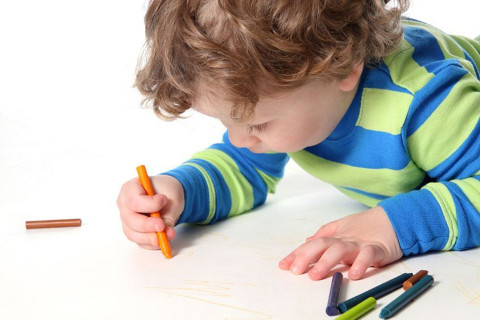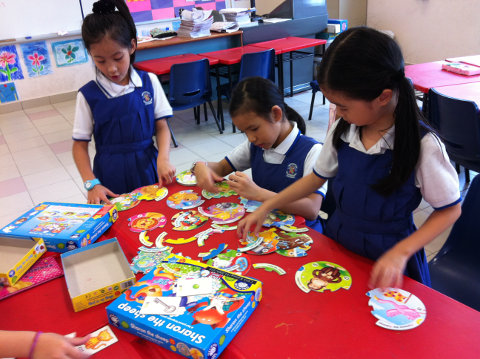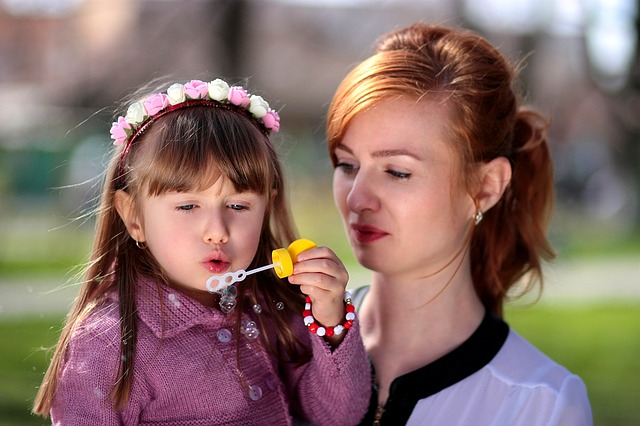Stepping into primary school is a significant transition for any child. What does your child need to know before going to Primary One? We speak to experts on how to ensure your child has a good start.

ENGLISH – What is expected
Read fluently
Your child should aim to have a degree of fluency and be able to recognise a range of sight words. “A strong understanding of phonics will be hugely beneficial and allow your child to get a head start,” says Mr Matthew Scott, Head of Pre-school, British Council.
Grasp simple meaning of texts
Mr Scott adds that beyond reading, an ability to grasp simple meaning of texts will provide your child with a sound platform to develop greater comprehension skills later on.
Express himself confidently
Most Primary One classes conduct “Show and Tell” sessions where your child is expected to speak in front of his peers. Mr Scott opined that clarity of expression and clear pronunciation will be highly valued. Your child will need to be able to confidently express himself and be heard in a large class of up to 30 learners.
Spell and write competently “A child that can spell and write competently will start Primary One at an advantage. An inability to do this or to write neatly can impede the progress a child can make,” observes Mr Scott.
Do this at home!
- Cultivate a love for stories

Mrs Carmee Lim, Mentor Principal, MindChamps, advocates for parents to seize every opportunity to read to their children. “Instead of fretting over whether your child meets the expectations of Primary One, why not take the year to read a thousand stories to your child?” encourages Mrs Lim. “Use different voices, action songs, drama and play to make stories come alive!” she adds. She also reminds parents that it is most important to let children have fun and enjoy themselves while acquiring the language.
- Focus on comprehension instead of fluency
Mr Scott notes that it is often the case that parents push their children to read fluently at the expense of their comprehension. He encourages parents to focus on helping the child comprehend what they are reading. The child will then enjoy the process and this in turn can lead to better literacy skills.
- Take a “Story Walk”
Ms Lia Testa Teismann, Academic Manager, British Council Katong Centre, echoes the importance of building on your child’s comprehension skills. She suggests doing a “Story Walk” where you look at the pictures and verbally tell the story without looking at the words.
Talk about any expectations you have for the story with your child. “All of these ‘pre-reading’ tasks will focus the child on the meaning of the story which, remember, is why we read stories,” reminds Ms Teismann. She adds that this will also provide context for children to guess unknown words and give them strategies to decipher or sound out new words.
- Make the written word come alive in daily living
Mrs Lim suggests that parents refrain from putting their children through excessive enrichment classes. She believes in bringing children out into the world and showing them how the language is part of our daily living. “Point to the road signs and labels in the malls. Encourage them to look at the written word,” said Mrs Lim.
- Doodle

Mrs Lim cautions against enforcing penmanship with pre-schoolers before they show signs of readiness to write. She rightly points out, “Writing is essentially circles, lines and dots. Let the children draw instead to strengthen their grip and hand muscles which will stage them for success when they eventually exhibit the readiness to write.”
![]()
MANDARIN – What is expected
Speaking, listening, reading, and writing
“Your child will definitely have an advantage if he can read and write simple sentences as well as understand simple instructions and hold a conversation in Mandarin,” says Ms Huang Ying, Principal of Chengzhu and Mandarin Programmes.
Do this at home!
- Caught not taught
In the early years, children have the ability to absorb the languages which surround them. “If you want to improve your child’s ability to communicate in Mandarin, you need to increase their exposure to the language. This is true not only with speaking and understanding the spoken language, but also reading and writing. Children need exposure to print and opportunities to write,” advises Ms Huang.
- Be a creative role model
The most important link in the process of learning a language is the person who models that language – the parent, the teacher, the guide. Ms Huang advocates, “The more creative the model, the more the child will become imaginatively involved and learn subconsciously, through play.” Ms Huang emphasises on the importance of ensuring that the learning process is a joy as it will lead to a lifetime of enjoyable communication for your child.
⇒ Related Read: How to get kids to love Chinese
![]()
MATHEMATICS – What is expected

Grasp basic math concepts and skills
According to Mr Lau Chin Loong, Principal and Director, Seriously Addictive Mathematics (S.A.M), it would be helpful to ensure that your child has knowledge of basic math concepts and skills such as:
- Rote-counting (reciting numbers in sequence till 100)
- Counting objects till 20, reading and writing the corresponding numbers
- Understanding the concept of addition and subtraction
- Adding and subtracting within 20 using strategies such as counting on and counting backwards
- Identifying basic shapes
- Patterning and
- Recognising all denomination of coins and small denominations of notes.
⇒ Related Read: How to help your child develop the right mindset for maths
Do this at home!
- Make mathematics relevant to your child’s life
“Present everyday objects and situations such as cooking and shopping as opportunities for learning and applying mathematics,” encourages Mr Lau. He adds that play and hands-on activities have been proven to be most effective in helping children understand and learn abstract math concepts.
- Focus on understanding concepts before introducing procedural skills

Mr Lau observes that a child who understands that addition means putting together and has experienced putting for example 12 and 19 objects together will be able to relate the procedure to that understanding. He urges parents to ensure that their child understands concepts before introducing procedural skills.
- Use a systematic 4-steps approach to problem solving
Mr Lau recommends parents to encourage their children to address word and non-routine problems using a systematic 4-step approach – understand the problem, devise a plan, apply the plan and check that the solution works and if it does not, try again. Mr Lau cautions against viewing problem solving as simply applying strategies.
![]()
SCIENCE – What is expected

Show an instinct to inquire, investigate and innovate
Associate Professor (A/P) Lim Tit Meng, Chief Executive, Science Centre Singapore (SCS) observes that young children are born with the fundamental instincts and natural tendency to inquire, investigate and innovate.
“When given a gadget or a toy, they will investigate how it works and explore alternative ways of playing with it. When given an everyday object such as a spoon or a pair of chopsticks, they will attempt to inquire and see what happens when these are used to hit a bowl or a glass,” elaborates A/P Lim. He encourages parents to build upon curious and inquisitive young minds whenever they ask questions about the what, why and how.
⇒ Related Read: Gearing up for Primary School Science
Do this at home!
- Adopt an ‘everyday and everywhere’ approach
A/P Lim encourages parents to draw their child’s attention to science concepts anywhere, anytime. “As a child’s brain develops rapidly during their formative years, this ‘everyday’ and ‘everywhere’ approach will satisfy their curiosity and spark a desire to explore deeper to find out more about their surroundings,” says A/P Lim.
He recommends that a useful way is to start with simple observations and gradually introduce hands-on experiments to help young children understand day-to-day science phenomena. One good activity to introduce is to let children play with soap bubbles. From here, parents can indirectly introduce science concepts such as elasticity, surface tension, properties of air, light and chemistry in an age-appropriate manner.
- Form your own ‘Kids Club’
A/P Lim suggests parents can form their own ‘Kids Club’ with like-minded friends who have children of similar ages. “Collectively, the kids are able to not only learn and enjoy science exploration through group visits to places including SCS, but also engage in hands-on activities together,” says A/P Lim. He shares that SCS is an alternative classroom for all ages. KidsSTOP™, for instance, was conceptualised specifically for children aged eight and below.
![]()
SOCIAL-EMOTIONAL – What is expected

Self-awareness and self-management
“During the early primary school years, children should be able to identify emotions and display basic self-regulation skills when angry or scared,” says Ms Eliza Leong, Educational and Developmental Psychologist, Thomson Paediatric Centre, Child Development Centre.
Social awareness and relationship skills
Ms Leong adds that children in early primary should be able to display social behaviours such as:
- Be a member of a group: share, listen, take turns, cooperate, negotiate disputes, be considerate and helpful.
- Initiate social interactions.
- Resolve interpersonal conflict without fighting (e.g. compromise).
- Show empathy towards their peers.
⇒ Related Read: Social/Emotional Development in Primary School Children
Do this at home!
- Playtime
Playing should be part of a child’s memorable childhood. Play is also a wonderful opportunity to pick up and practice various social skills like turn-taking, sharing, and cooperating with their peers. Ms Leong encourages parents to provide their children with opportunities to interact with others. “Arrange for play dates or expose your child to different social situations where they get to practise their social skills,” suggests Ms Leong.
- Getting used to the school routine

Ease your child into the school routine by showing him the school publications like newsletters. Talk about the various activities and the different locations such as flag raising in the hall, recess in the canteen, pick up and drop off points for the school bus and going through a potential timetable.
You can also practise things like packing his school bag, wearing his uniform, buying food and receiving change, in preparation for recess. By normalising such activities and giving your child an increased sense of predictability, he should be able to handle Primary One with greater ease.
- Allaying fears and concerns
Your child may also bring home various needs and fears from school. Make it a point to have regular chats with him about his day. Ms Leong reminds parents that it is important to listen and validate their child’s emotional experience. Pay particular attention to his non-verbal communications.
What all our experts say
Learning is a lifelong journey and instilling a love for learning will stage your children for greater success in life. Your patience, kindness, and encouragement will go a long way as your child makes the transition to Primary One. Remember not to focus excessively on outcomes but to strive to make learning a fun and enjoyable process for your little ones.
By Rachel Lim.
This article was first published in The New Age Parents e-magazine.
* * * * *
Like what you see here? Get parenting tips and stories straight to your inbox! Join our mailing list here.
Want to be heard 👂 and seen 👀 by over 100,000 parents in Singapore? We can help! Leave your contact here and we’ll be in touch.

























































Leave a Comment: